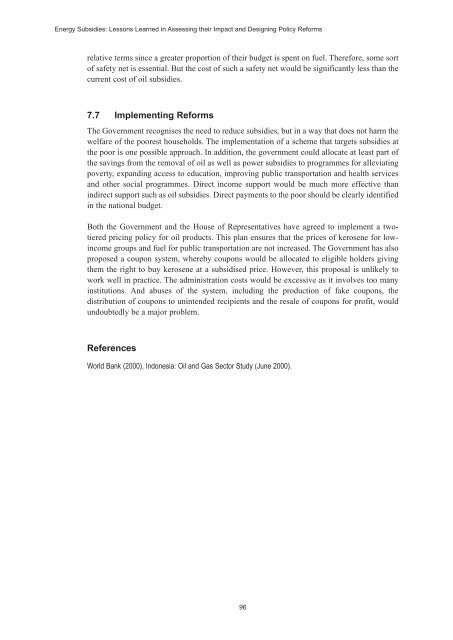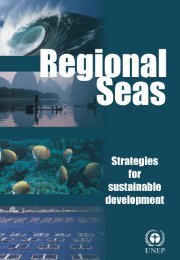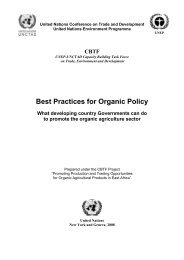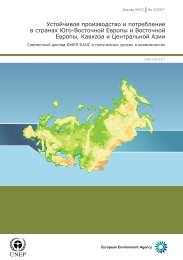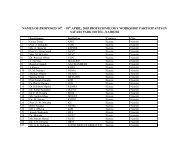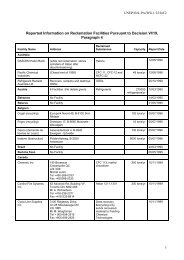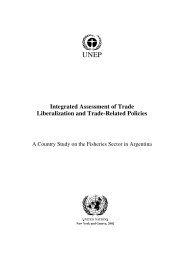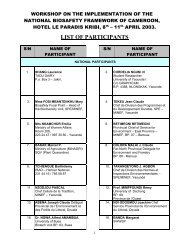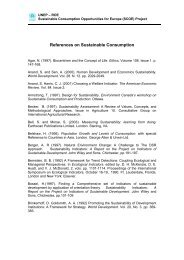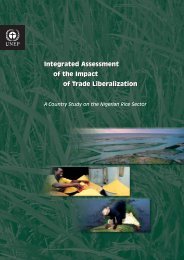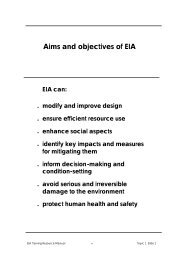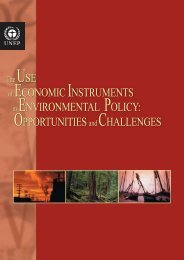Energy Subsidies: Lessons Learned in Assessing their Impact - UNEP
Energy Subsidies: Lessons Learned in Assessing their Impact - UNEP
Energy Subsidies: Lessons Learned in Assessing their Impact - UNEP
Create successful ePaper yourself
Turn your PDF publications into a flip-book with our unique Google optimized e-Paper software.
<strong>Energy</strong> <strong>Subsidies</strong>: <strong>Lessons</strong> <strong>Learned</strong> <strong>in</strong> Assess<strong>in</strong>g <strong>their</strong> <strong>Impact</strong> and Design<strong>in</strong>g Policy Reforms<br />
relative terms s<strong>in</strong>ce a greater proportion of <strong>their</strong> budget is spent on fuel. Therefore, some sort<br />
of safety net is essential. But the cost of such a safety net would be significantly less than the<br />
current cost of oil subsidies.<br />
7.7 Implement<strong>in</strong>g Reforms<br />
The Government recognises the need to reduce subsidies, but <strong>in</strong> a way that does not harm the<br />
welfare of the poorest households. The implementation of a scheme that targets subsidies at<br />
the poor is one possible approach. In addition, the government could allocate at least part of<br />
the sav<strong>in</strong>gs from the removal of oil as well as power subsidies to programmes for alleviat<strong>in</strong>g<br />
poverty, expand<strong>in</strong>g access to education, improv<strong>in</strong>g public transportation and health services<br />
and other social programmes. Direct <strong>in</strong>come support would be much more effective than<br />
<strong>in</strong>direct support such as oil subsidies. Direct payments to the poor should be clearly identified<br />
<strong>in</strong> the national budget.<br />
Both the Government and the House of Representatives have agreed to implement a twotiered<br />
pric<strong>in</strong>g policy for oil products. This plan ensures that the prices of kerosene for low<strong>in</strong>come<br />
groups and fuel for public transportation are not <strong>in</strong>creased. The Government has also<br />
proposed a coupon system, whereby coupons would be allocated to eligible holders giv<strong>in</strong>g<br />
them the right to buy kerosene at a subsidised price. However, this proposal is unlikely to<br />
work well <strong>in</strong> practice. The adm<strong>in</strong>istration costs would be excessive as it <strong>in</strong>volves too many<br />
<strong>in</strong>stitutions. And abuses of the system, <strong>in</strong>clud<strong>in</strong>g the production of fake coupons, the<br />
distribution of coupons to un<strong>in</strong>tended recipients and the resale of coupons for profit, would<br />
undoubtedly be a major problem.<br />
References<br />
World Bank (2000), Indonesia: Oil and Gas Sector Study (June 2000).<br />
96


